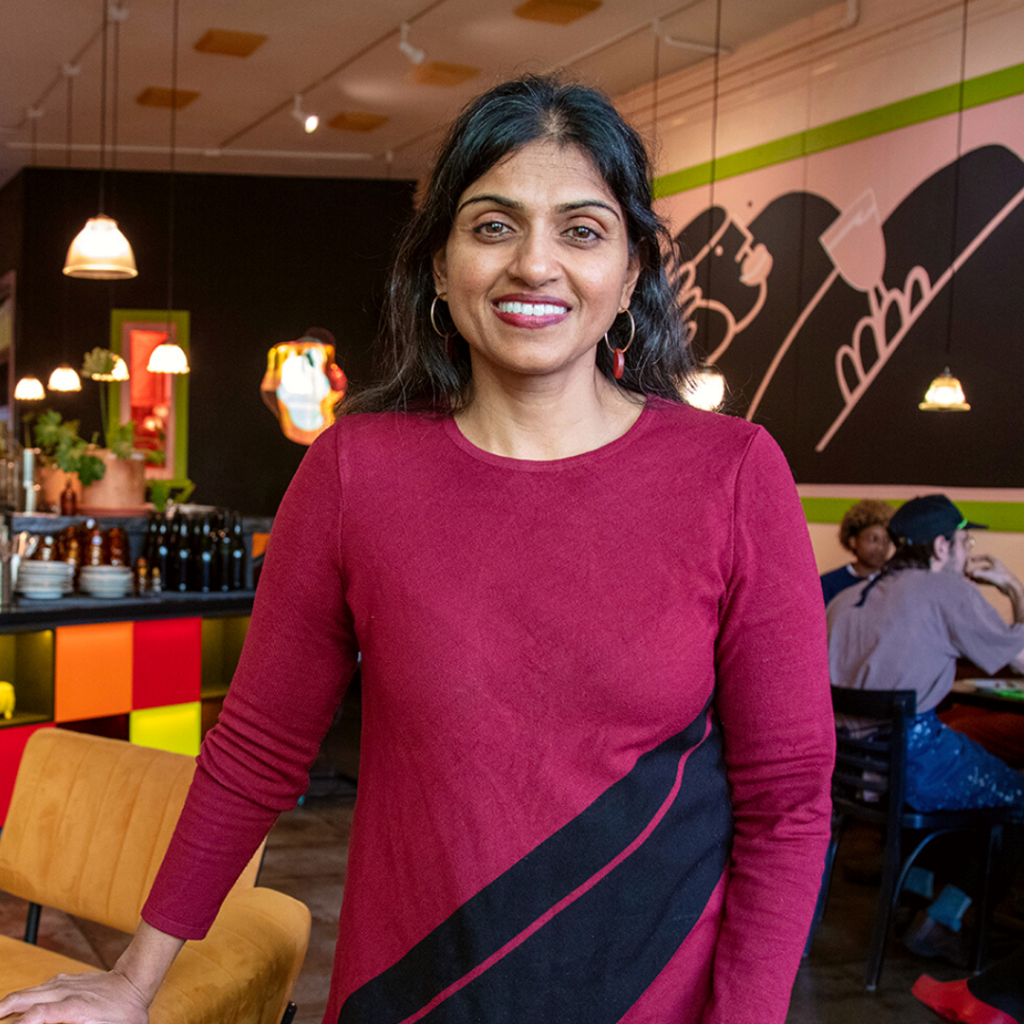Improving pay and working conditions for Californians through advocacy, organizing, and shifting the narrative about the value of work
Overview
Raised in an immigrant family, Saru Jayaraman was keenly aware of the dynamics faced by immigrants and low-paid workers, including substandard conditions and limited respect for their labor. In 2019 Jayaraman founded One Fair Wage to raise wages, eliminate subminimum wages, and improve the working conditions of “high-skill, low-wage” workers. When the pandemic struck, millions of workers either lost their jobs or faced dangerous working conditions. Drawing on her decades of experience advocating for workers — starting with “back of house” restaurant workers in 2001 and expanding to all workers paid low wages — Jayaraman jumped into action in early 2020. In just four months she raised $24 million to support service workers and quickly mobilized tens of thousands to help lead an emerging and unprecedented new worker rights movement. As millions of workers increasingly reject low-wage jobs, Jayaraman is passionate about harnessing the momentum and finding new ways to advocate for and celebrate California’s workers. A key priority is raising California’s minimum wage to better reflect the state’s rising cost of living. She is also partnering with like-minded restaurant owners to improve working conditions, confronting subminimal wages for people who are incarcerated, and changing public perceptions about the value of work.
It’s not the Great Resignation, it’s the Great Revolution. And it’s not going anywhere.
– Saru Jayaraman
Primary Regions Served
Challenge
- Historic numbers of workers have quit their jobs or chosen not to return to positions from which they were laid off during the pandemic. Restaurant workers are among those most likely to quit.
- Workers cite several reasons for leaving their jobs: low wages, hostile work environments, lack of benefits and advancement opportunities, and long-lasting job dissatisfaction.[1]
- Home to 1.7 million restaurant workers, California is one of seven states that requires employers to pay tipped workers at least the full minimum wage of $15.50 per hour in addition to any tips they may receive.[2]
- While notably higher than most states, California’s minimum wage remains well below the state’s living wage which is estimated to be $21.82 per hour for a single adult and a minimum of $54.95 per hour needed to care for two children.[3]
Innovation
- In California, One Fair Wage is co-leading the effort to raise the minimum wage to cover the cost of living statewide and fighting to end the subminimum wage for incarcerated workers.
- One Fair Wage has also ventured into less common territory for the labor movement, providing support to employers. Notably, Jayaraman partnered with Governor Newsom’s administration to launch “High Road Restaurants,” a pandemic-era effort that provided funding to 50 restaurant owners in exchange for their participation in racial equity training and promise to provide free meals in their communities.
- Jayaraman’s work in California is poised to be replicated across the country. One Fair Wage is active in 24 other states, and currently driving the 25 by 250 campaign, an effort to end subminimum wages in 25 states by 2026, the United States’ 250th anniversary.
Impact
- Jayaraman was among the key leaders to earn passage of the Raise the Wage Act in the U.S. House of Representatives in 2019 and 2021. The bill would have raised the federal minimum wage to $15 per hour. Though the bill did not become law, it did represent the first time since Emancipation that Congress acted to end subminimum wage for tipped workers.
- In 2022, Jayaraman successfully led the passage of legislation similar to the Raise the Wage Act in Michigan and Washington D.C., securing raises for approximately 715,000 workers.
- With funds Jayaraman raised from 90,000 donors, businesses, and foundations, One Fair Wage provided legal services and cash grants to over 50,000 workers and employers.
- Restaurants participating in the High Road Kitchens program have, on average, increased their hourly wages from $15 to $20 and most have adopted racial equity practices. For example, 58 percent of participating employers have encouraged people of color and women to apply for internal career growth opportunities and 21 percent have removed requirements to disclose prior convictions or obtain education not related to the position.
- One Fair Wage has quickly cultivated a membership of 48,000 workers in California who are forming a statewide service workers’ cooperative to demand better working conditions and pay.
Opportunity
- One Fair Wage is co-leading a coalition of labor and criminal justice advocates who are organizing to increase California’s minimum wage to cover the cost of living statewide and to end the subminimum wage for incarcerated workers — a direct legacy of slavery.
- Jayaraman is working to expand the High Road Kitchens Program, supporting hundreds more California restaurants to raise wages and increase race and gender equity and mobility for workers of color. Ultimately, Jayaraman envisions professionalizing the service sector, so that service workers are valued as the skilled professionals that they are.
- Californians who handle food are required by state law to complete a training and exam to verify that they have sufficient knowledge to protect the public from foodborne illnesses. One Fair Wage is piloting an expansion of this training to include information about worker rights.
The written profile and video reflect the work of the leader(s) the year they received a Leadership Award. Please contact the leader(s) for current information.
